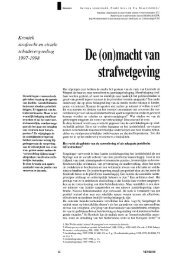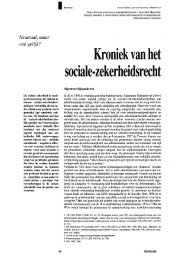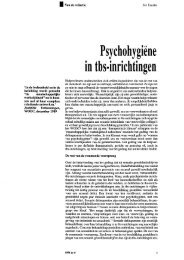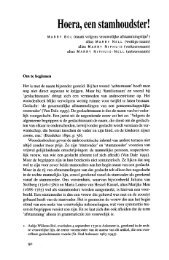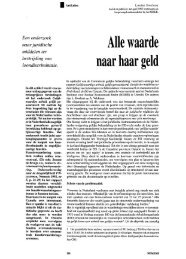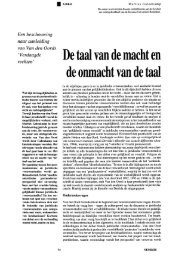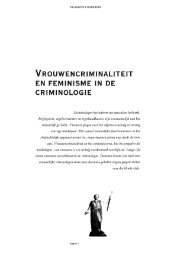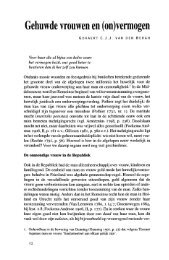(2001) nummer 1 januari/februari - Nemesis
(2001) nummer 1 januari/februari - Nemesis
(2001) nummer 1 januari/februari - Nemesis
Create successful ePaper yourself
Turn your PDF publications into a flip-book with our unique Google optimized e-Paper software.
elates to their reproductive functions,<br />
for example, where there is a requirement<br />
for the husband's authorization to<br />
make a decision in regard to sterilization,<br />
where general requirements are<br />
imposed for the sterilization of women,<br />
such as having a certain number of<br />
children or being of a certain age, or<br />
where States impose a legal duty upon<br />
doctors and other health personnel to<br />
report cases of women who have undergone<br />
abortion. In these instances,<br />
other rights in the Covenant, such as<br />
those of articles 6 and 7, might also be<br />
at stake. Women's privacy may also be<br />
interfered with by private actors, such<br />
as employers who request a pregnancy<br />
test before hiring a woman. States parties<br />
should report on any laws and public<br />
or private actions that interfere with<br />
the equal enjoyment by women of the<br />
rights under article 17, and on the measures<br />
taken to eliminate such interference<br />
and to afford women protection<br />
from any such interference.<br />
21. States parties must take measures to<br />
ensure that freedom of thought, conscience<br />
and religion, and the freedom<br />
to adopt the religion or belief of one's<br />
choice - including the freedom to<br />
change religion or belief and to express<br />
one's religion or belief - will be guaranteed<br />
and protected in law and in<br />
practice for both men and women, on<br />
the same terms and without discrimination.<br />
These freedoms protected by article<br />
18, must not be subject to restrictions<br />
other than those authorized by the<br />
Covenant, and must not be constrained<br />
by, inter alia, rules requiring permission<br />
from third parties, or by interference<br />
from fathers, husbands, brothers<br />
or others. Article 18 may not be relied<br />
upon to justify discrimination against<br />
women by reference to freedom of<br />
thought, conscience and religion;<br />
States parties should therefore provide<br />
information on the status of women as<br />
regards their freedom of thought, conscience<br />
and religion, and indicate what<br />
steps they have taken or intend to take<br />
both to eliminate and prevent infringements<br />
of these freedoms in respect of<br />
women and to protect their rights<br />
against any discrimination.<br />
22. In relation to article 19 States parties<br />
should inform the Committee of<br />
any laws or other factors which may<br />
impede women from exercising the<br />
rights protected under this provision on<br />
an equal basis. As the publication and<br />
dissemination of obscene and pornographic<br />
material which portrays<br />
women and girls as objects of violence<br />
or degrading or inhuman treatment is<br />
WETGEVING<br />
likely to promote these kinds of treatment<br />
of women and girls, States parties<br />
should provide information about legal<br />
measures to restrict the publication or<br />
dissemination of such material.<br />
23. States are required to treat men and<br />
women equally in regard to marriage in<br />
accordance with article 23, which has<br />
been elaborated further by General<br />
Comment 19 (1990). Men and women<br />
have the right to enter into marriage only<br />
with their free and Ml consent, and<br />
States have an obligation to protect the<br />
enjoyment of this right on an equal basis.<br />
Many factors may prevent women<br />
from being able to make the decision to<br />
marry freely. One factor relates to the<br />
minimum age for marriage. That age<br />
should be set by the State on the basis<br />
of equal criteria for men and women.<br />
These criteria should ensure women's<br />
capacity to make an informed and uncoerced<br />
decision. A second factor in<br />
some States may be that either by statutory<br />
or customary law a guardian, who<br />
is generally male, consents to the marriage<br />
instead of the woman herself,<br />
thereby preventing women from exercising<br />
a free choice.<br />
24. A different factor that may affect<br />
women's right to marry only when they<br />
have given free and full consent is the<br />
existence of social attitudes which tend<br />
to marginalize women victims of rape<br />
and put pressure on them to agree to<br />
marriage. A woman's free and full consent<br />
to marriage may also be undermined<br />
by laws which allow the rapist to<br />
have his criminal responsibility extinguished<br />
or mitigated if he marries the<br />
victim. States parties should indicate<br />
whether marrying the victim extinguishes<br />
or mitigates criminal responsibility<br />
and in the case in which the victim<br />
is a minor whether the rape reduces<br />
the marriageable age of the victim, particularly<br />
in societies where rape victims<br />
have to endure marginalization<br />
from society. A different aspect of the<br />
right to marry may be affected when<br />
States impose restrictions on remarriage<br />
by women as compared to men.<br />
Also the right to choose one's spouse<br />
may be restricted by laws or practices<br />
that prevent the marriage of a woman<br />
of a particular religion with a man who<br />
professes no religion or a different religion.<br />
States should provide information<br />
on these laws and practices and on<br />
the measures taken to abolish the laws<br />
and eradicate the practices which undermine<br />
the right of women to marry<br />
only when they have given free and full<br />
consent. It should also be noted that<br />
equality of treatment with regard to the<br />
right to marry implies that polygamy is<br />
incompatible with this principle.<br />
Polygamy violates the dignity of<br />
women. It is an inadmissible discrimination<br />
against women. Consequently,<br />
it should be definitely abolished wherever<br />
it continues to exist.<br />
25. To fulfill their obligations under article<br />
23, paragraph 4, States must ensure<br />
that the matrimonial regime contains<br />
equal rights and obligations for<br />
both spouses, with regard to the custody<br />
and care of children, the children's<br />
religious and moral education,<br />
the capacity to transmit to children the<br />
parent's nationality, and the ownership<br />
or administration of property, whether<br />
common property or property in the<br />
sole ownership of either spouse. States<br />
should review their legislation to ensure<br />
that married women have equal<br />
rights in regard to the ownership and<br />
administration of such property, where<br />
necessary. Also, States should ensure<br />
that no sex-.based discrimination occurs<br />
in respect of the acquisition or loss<br />
of nationality by reason of marriage, of<br />
residence rights and of the right of each<br />
spouse to retain the use of his or her<br />
original family name or to participate<br />
on an equal basis in the choice of a new<br />
family name. Equality during marriage<br />
implies that husband and wife should<br />
participate equally in responsibility<br />
and authority within the family.<br />
26. States must also ensure equality in<br />
regard to the dissolution of marriage,<br />
which excludes the possibility of repudiation.<br />
The grounds for divorce and<br />
annulment should be the same for men<br />
and women, as well as decisions with<br />
regard to property distribution, alimony<br />
and the custody of children. The<br />
need to maintain contact between children<br />
and the non-custodian parent,<br />
should be based on equal considerations.<br />
Women should also have equal<br />
inheritance rights to those of men when<br />
the dissolution of marriage is caused by<br />
the dedth of one of the spouses.<br />
27. In giving effect to recognition of<br />
the family in the context of article 23, it<br />
is important to accept the concept of<br />
the various forms of family, including<br />
unmarried couples and their children<br />
and single parents and their children<br />
and to ensure the equal treatment of<br />
women in these contexts (General<br />
Comment 19 paragraph 2 last sentence).<br />
Single parent families frequently<br />
consist of a single woman caring for<br />
one or more children, and States parties<br />
should describe what measures of support<br />
are in place to enable her to discharge<br />
her parental functions on the ba-<br />
NEMESIS <strong>2001</strong> nr. 1 21



